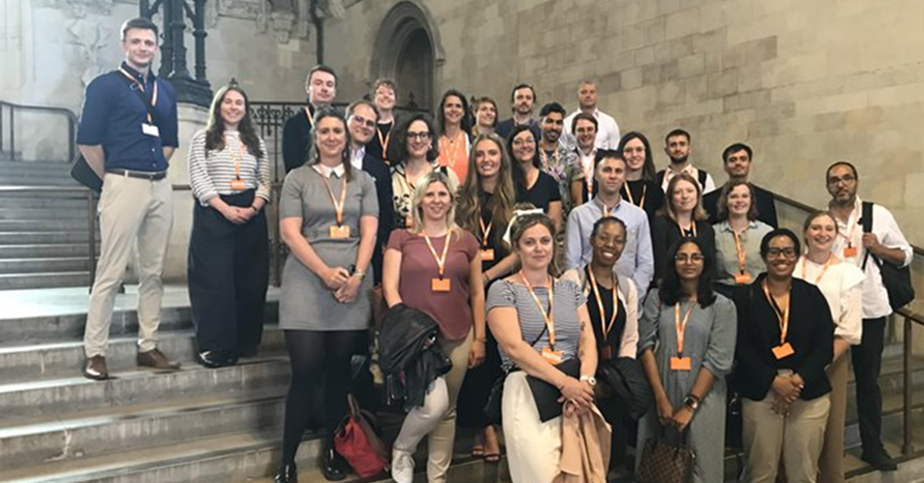FST BLOG
What it means to be a Foundation Future Leader
- 22 August 2025
- Education, General
- Dr Tobiasz Trawiński

Joining the Foundation Future Leaders Programme has been one of the most rewarding steps in my career so far. Right from the start, it felt clear this wasn’t just another leadership course. It’s about building a community of people who care deeply about the future of science and technology. For me, it’s been a chance to step out of my academic bubble, challenge my own thinking, and experience opportunities I’d never have had otherwise.
My story with FST began a little earlier, when I started going to their events. They always attract a real mix of policymakers, academics, and industry leaders. They force you to zoom out and think about the bigger picture of UK research and innovation. I still remember my very first event, on The Role of UK National Laboratories. After the talk, I found myself in conversation with Sir Patrick Vallance. At the time, I had no idea I was chatting to someone who would next month become Minister of State for Science and Technology! Meetings like that set the tone for what FST events would become for me - moments of intellectual feast within the day-to-day academic life of teaching, gathering and analysing data, and writing.
Since then, I’ve often found myself planning trips on the tilting train from Liverpool to London around FST events. Every time I walk into those rooms full of inspiring people, I feel a spark of excitement. So, when I learned of the opportunity to take part in a more structured experience through the Foundation Future Leaders Programme, I knew immediately that I wanted to apply.
I was fortunate to be selected for the 2025 cohort. It’s a diverse group, with people from universities, industry, and the civil service. The programme itself has two main strands. The first is our fortnightly cohort sessions, where we share our work and try to explain it in ways that make sense across disciplines. For me, as a psychologist, it’s both humbling and fascinating. One week you’re hearing about AI in medical diagnostics, the next about space exploration or nuclear fusion research. It’s made me realise just how rich and varied the research and innovation landscape is, and how rarely we get the chance to experience it all in one place.
The second strand involves meeting people in government, parliament, university and industry. One of the important moments for me was a conversation in Parliament with Dame Chi Onwurah, Chair of the Science, Innovation and Technology Committee. She spoke about the huge task of scrutinising government policy and making sure it’s rooted in evidence. Until that point, I’d never truly appreciated the scale of parliamentary scrutiny, or the role science plays in shaping decisions. That discussion gave me a whole new perspective on how voices like ours, people working in research and innovation, can feed into policy in meaningful ways.
Another part of the programme I’ve really valued is connecting with alumni. At this year’s alumni event in Southampton, I found myself both nostalgic (as I did my PhD there) and inspired. Hearing their journeys, the twists, challenges, and achievements, reminded me that careers rarely follow a straight line, but curiosity and collaboration carry you forward.
And then, there’s the Foundation Future Leaders 2025 conference. Helping to organise it has been a highlight. From shaping the agenda to coordinating speakers, it’s been a crash course in teamwork and event planning. This year’s conference will take place in Liverpool, which feels extra special for me. Alongside plenary sessions on regional science and technology, and the barriers to successful innovation, we’ve designed parallel blocks on health, AI, and energy. The idea is to make the event lively while also generating insights we can build into a future policy report.
Looking back, I’m struck by how much I’ve grown through this programme – not just in skills and knowledge, but in confidence and perspective. It’s taught me to listen as much as I speak, to ask bigger questions, and to put my work into a wider societal context. Even something as simple as learning to explain my research in two sentences has been a game-changer!
Looking ahead, I feel energised. I’m excited to keep contributing to the Foundation. Being part of the Future Leaders community isn’t just a privilege. It’s a constant source of inspiration.
Dr Tobiasz Trawiński is a Senior Lecturer in Psychology at Liverpool Hope University. His research focuses on how personality traits and attitudes shape engagement with communities and their cultural heritage. He is also a member of the Health Research Authority’s Research Ethics Committee, the Parliamentary and Scientific Committee APPG, and a Fellow of the Royal Society of Arts.
